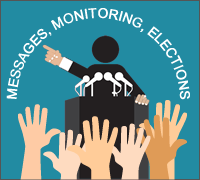|
||||||||||||||||
Publications Impartial media - a fundamental value of the European Union
Promotion of democracy is one of the major priorities in the activities of the Bulgarian non-government organization “Institute for Social Integration” (ISI). All the breaches of human rights and the disturbing tendencies according freedom of speech in the media are important issues in EU and all democratic societies should not omit. Among all the Bulgarians more often is visible increasing homesickness on “the order from the past” and this is provoked by the existing nowadays freedom of speech in danger.
Galina Asenova, Stefan Georgiev Published in the periodical edition of the European Network of Political Foundations, March 2011 ENoP_Quarterly_09 In middle of January 2011, IfSI and Friedrich Ebert Stiftung (FES) - Office Bulgaria, organized together a public discussion on “Impartial media and media legislation”. The two organizations were represented by Mr. Marc Meinardus, Ph.D. (FES) and Mr. Yurii Aslanov (IfSI), Ph.D. All invited guests were top journalists from the Bulgarian media, members of the Bulgarian parliament, Members of the European Parliament and diplomats. Among the most active were the Bulgarian National Television, Bulgarian National Radio, TV Channel 3, dailies “Trud”, “24 Hours”, "Duma, "Land", sociological agencies “Galap” and “Afis” and others. For both, politicians and media, truth and trust are strictly important. Oftentimes is evident the necessity of rehabilitating the qualitative journalism as far as it is clear that without high level policy, the development of one country is far from the right direction and obviously in danger. Today in Bulgaria there is less and less space for professional journalism – vulgarity in policy is transforming in vulgarity in journalism. People who are trying to be professionals in the field of professional journalism are not so stimulated and this is basically the truth. People, who are striving for objectivity are on their way of staying alone at the end, and these were the words of a Bulgarian deputy. In people’s mind there is more and more apathy, the society is folding in its shell. For the past two years the “Press freedom index” for Bulgaria according Reporters without borders has drooped 13 points – from 58 to 71. Among the topics of discussion were the media advertising market in terms of monopoly and also the distribution of printed press, the reduction of the advertising market, the pressure and attempts for political censorship, and also auto-censorship of media and its influence over the public agenda. The wiretapping and phone tapping is a unique mass phenomenon in Bulgaria (for the past year have being used about 20 000 wiretaps in general) and this issue is embarrassing and problematic for all the participants in the discussion. Anxiously we have to notice that this problem doesn’t occupy major part of the public society agenda. At the same time the market for yellow press is increasing more and more and this type of media is turning itself in basic tool in terms of forming public opinion. Some participants in the discussion perceive some hope in Internet and the media in this point of view, although this is not enough for forming independent media. Despite all the purposive efforts of the governance for manipulating and subordinating the media, Internet is a field which is not subject to manipulation in a way. Internet is turning into an area where independent public opinion can be formed, at the same time all the social networks are gathering strength. The discussion is very important in the eve of passing a new media legislation and it is a noticeable highlighter at this point, concluded the Chairman of The Council for Electronic Media. A group of experts have come to the conclusion that the leading role must be taken by transparency in terms of ownership and possession of media. The statutes of Bulgarian public media are the most conflicting point. In this situation the arguable question concern the legislation. Is it right to pass to laws at the same time – one for private media and another for the state-owned media? Whatever the decision could be, it should be clear what are the expectations from the media vis a vis The State, especially in such cases when the State is giving money. “Right now we are in the situation where public media are pretending to be private, at the same time private media are pretending to implement public mission. The result could be seen as forming of some strange media creatures and somehow we have forgotten that our public media are part of our cultural identity“ remarked a member of the Parliament. In the field of media legislation many issues were mentioned such as: How to protect the independence and personal freedom of the journalist? Is the Ethic codex of the journalist useful and effective? What about transparency in terms of media owners and their funding? Do we need journalistic syndicate and what should be its terms and conditions? There were also a lot of questions concerning identity and ownership of electronic media in Bulgaria. The topic is extremely important for Bulgaria especially in terms of the forthcoming elections at the end of the year 2011 and the media as a leading actor and generator of public opinion. IfSI and FES will continue their efforts to stimulate discussions in the public opinion and to implement monitoring and overviews on major European issues.
|
||||||||||||||||

